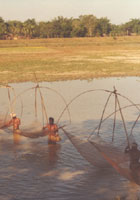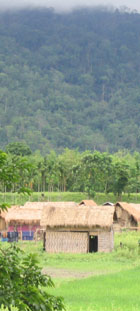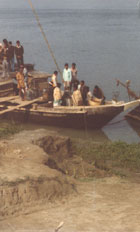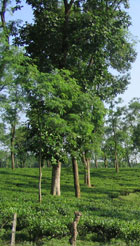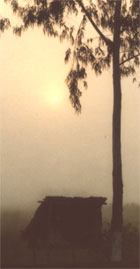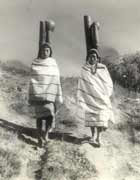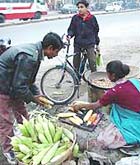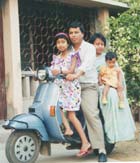Born and brought up at Jorhat, Assam, I am the eldest son of A.Q.M. Salehuddin and Najmun Nisha. My father was an educationalist who served as a Principal of Kohima Polythechnical School. I have an elder sister, 3 younger brothers and a younger sister.
Thanks to the support and sacrifice of my parents I was able to study in Ernakulam, South India and then to sail to Europe. My father had to support also the study of the other children. I was privileged as well as lucky to get the opportunity to follow the profession of my choosing in Europe - thanks again to the moral and material support of my parents.
At present in the Netherlands I live a life full of modern facilities and gadgets. In the midst of present affluence the “root” at home beckons me. My roots are humble. I come from a middleclass family and I grew up in a very different environment than what one finds in Assam of today.
In my childhood not all houses had electricity. There was also no electricity at my parent's home. Hence I grew up without radios, refrigerators, electrical fans, and air conditioners, running water or flush toilets. Also in those days, unknown to us were products like contact lenses, copying and fax machines, ballpoints, gas cylinders etc.
At Jorhat, in my early schooldays, at dawn before the world woke up, a group of Harijan men and women employed by the municipality started their work by collecting night soil. They went from house to house to collect human excreta in a large tin then carry on the same to deposit it in a big tank, which was then pulled away by a tractor. Some of us would not like to remember that such professions existed in a free country like India.
In those days we did not hear about CD, DVD, MP3, video, PIN, magnetrons, artificial kidneys, GSM, word processing, computers, Internet, e-mail, chat rooms, ATM, jet engines, satellites or hippies and yuppies. We never heard of mid-life crisis or the burnout syndrome or the LAT (living apart together) relation. We knew only about 33 RPM gramophone records of His Masters Voice. The dentist of my childhood used a foot driven machine to drill a tooth.
We did not know that cars should have seat belts or air bags. Travelling from Kohima to Jorhat in the back of a pick-up van was exciting and fun. We shared the same soda bottle with friends, drank tea in the road stalls, eat snacks sold by road side vendors and still survived. We did not know that we had to make an appoitment to visit friends or relatives. We did not know about agenda's. We just walked or cycled to a friend's or relatives house, just yelled for them or walked in. We did not knock on the door or rang the bell. The doors were always open and the houses did not have bells to ring.
In our young days when something happened in the town the main means of mass communication was a rickshaw fitted with a loudspeaker announcing the coming event which was most of the time about screening of a new film. We may be the last generation who thought that one needs a man to have a baby. Artificial insemination and test tube babies were unheard of. No wonder that there is a generation gap. But we have survived.
When I am in The Netherlands my longing for “home” in Assam comes to surface. But when I am in Assam and face the infrastructure, the bureaucracy, the “bandh culture” which prevents the progress of Assam, the day-to-day problems and the omnipresent corruption, I want to take the next available flight and come back to The Netherlands.
I am like a person sailing at the same time in two boats, one foot in each boat trying to keep his equilibrium. Down in heart there is still the longing for Assam; where I wish to be watching the leaves of the bamboo trees dancing in the evening breeze, the dust settling down on the road after being disturbed by a passing truck and watching the sun go down the horizon over the endless paddy fields.
The smell of the freshly covered wall with a mixture of mud and cow-dung and the smell of the freshly white washed wall with a coating of lime, the last day at school before the summer holidays, the smell of the garland of “Bokul ful” are now things of the past.
Angling at the Toklai river, throwing of a fishing net at the pond of my grandparents, plucking mangoes at the heat of the noon - when the elders were having their siesta, the sight of the innumerable glow-worms lighting the dark evenings accompanied by the “chorus” of the crickets, the ‘Bora chaul” (stiky rice) cooked inside a bamboo by my uncle, the flickering light of the kerosene lamp illuminating a smoke filled kitchen, the smell of the burning wood combined with the smell of the delicious dishes cooked by my mother, the sound of the jackals howling nearby or a star-filled night sky are some of the childhood memories, which I carry close to my heart.
There is nothing like the smell of the fresh air after a downpour or the sound of the monsoon rain. First a few drops followed by a heavy downpour. To fall asleep listening to the sound of the rain falling on the tin roof and to wake up next morning with the cacophony of birds and then to encounter the lush green all around - as if God Almighty has personally taken care to clean each and every individual leaf of the trees.
After all these years in Europe I can now understand why some of the famous personalities appreciated the contribution made by India.
- Albert Einstein said: We owe a lot to the Indians, who taught us how to count, without which no worthwhile scientific discovery could have been made.
- Mark Twain said: India is, the cradle of the human race, the birthplace of human speech, the mother of history, the grandmother of legend, and the great grand mother of tradition. Our most valuable and most instructive materials in the history of man are treasured up in India only.
- French scholar Romain Rolland said: If there is one place on the face of earth where all the dreams of living men have found a home from the very earliest days when man began the dream of existence, it is India.
- Hu Shih, former Ambassador of China to USA said: India conquered and dominated China culturally for 20 centuries without ever having to send a single soldier across her border.
I can say that I left India to seek better opportunities in my professional field but India never left me.
Photo's by Priya Ahmed, USA and Wahid Saleh.



